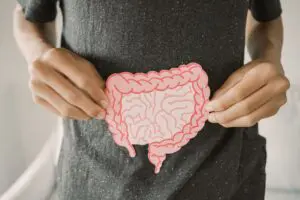By Ross Pelton, RPh, PhD, CCN
Scientific Director, Essential Formulas
The term Essential Nutrients refers to nutrients that are required for normal functioning and, they are also nutrients humans are not capable of making. For decades, scientists assumed that the only way humans could obtain our essential nutrients was from the foods we eat or by taking nutritional supplements. However, scientists have recently learned that some of our critical essential nutrients are produced in the gastrointestinal tract by various strains of probiotic bacteria.
Scientists are discovering that probiotic bacteria are amazingly complex little chemical manufacturing factories. When probiotic bacteria ferment dietary fibers, they create compounds that are referred to as postbiotic metabolites. Scientists have recently confirmed that a number of the postbiotic metabolites that our probiotic bacteria make are some of our important essential nutrients.
Probiotic-Produced Nutrients
B-Vitamins: All of our B-vitamins (B1, B2, B3, B5, B6, B12, biotin and folic acid) are synthesized in the colon by various strains of probiotic bacteria.i,ii,iii B-vitamins are necessary for vital chemical reactions in every cell through the human body.
In addition to humans benefiting from the B-vitamins their gut bacteria produce, some strains of bacteria actively cooperate by exchanging B-vitamins among each other for mutual benefit and survival. For example, Probiotic Strain A produces vitamin B12 and Probiotic Strain B synthesizes vitamin B6. Probiotic Strains A and B require both require vitamins B6 and B12 to survive. Therefore, strain A utilizes the B6 that strain B produces, and strain B utilizes the B12 that strain A produces and they each successfully exist in a supportive symbiotic relationship.iv
Vitamin K, which regulates blood clotting and the deposition of calcium into bones is synthesized by strains of bacteria that primarily reside in the colon.v,vi The following genera of lactic acid-producing bacteria are known to synthesize vitamin K2: Lactobacillus, Lactococcus, Enterococcus, Leuconostococcus, and Streptococcus.vii
Amino Acids: Many strains of bacteria are capable of producing all 20 of the most common amino acids.viii Amino acids that are known to be produced by gut bacteria in the human microbiome include the following:
- Aromatic amino acids, which include tryptophan, tyrosine and phenylalanine.ix Humans cannot make these amino acids. However, various strains of bacteria are able to synthesize these amino acids, which are essential for growth. The aromatic amino acids are also the precursors for the important neurotransmitters, serotonin, dopamine and norepinephrine, which regulate many biological processes in humans.x
- Branched-chain amino acids (BCAAs), which include leucine, isoleucine and valine.xi BCAAs are help support muscle metabolism and the building of proteins in muscle tissue. They are involved in a wide range of body functions such as growth, healing and repair, digestive processes and energy production.
The recent understanding that various strains of probiotic bacteria synthesize important nutrients provides new insight into how humans get some their most important nutritional needs met.
Research conducted in Japan in 2017 revealed that Dr. Ohhira’s Probiotics contain the following B-vitamins: B2, B3, B6, biotin, and inositol. It was additionally reported that Dr. Ohhira’s Probiotics contain vitamin A, beta-carotene, vitamin E, and the minerals calcium, iron, magnesium, manganese, phosphorus, potassium, sodium, and zinc. Thus, in addition to delivering probiotic bacteria and prebiotic foods, some of the postbiotic metabolites in Dr. Ohhira’s Probiotics are important essential nutrients that help people meet their daily nutritional requirements.






